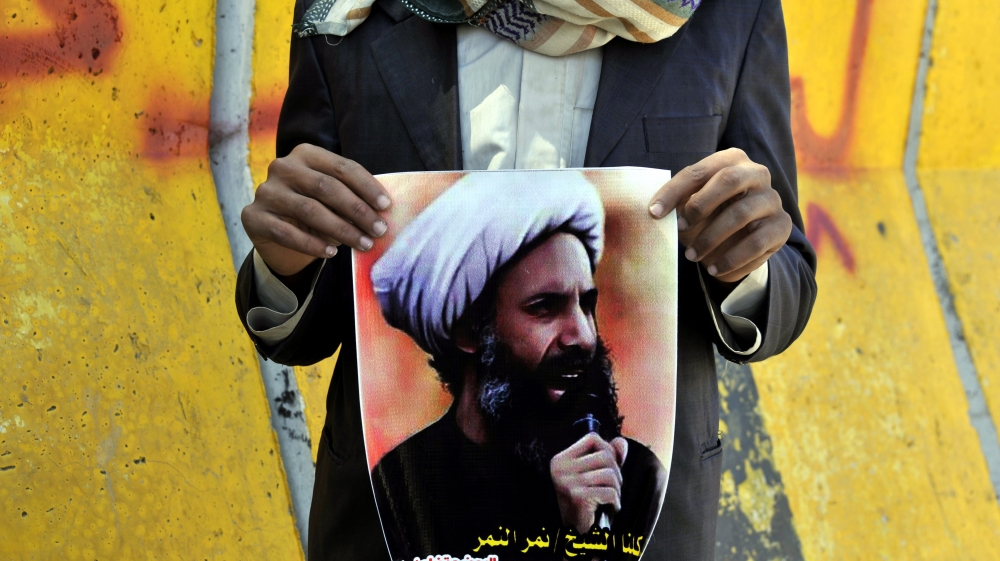Iran and Saudi Arabia wage war of words
Riyadh accuses Iran of supporting terrorism as Tehran condemns execution of Shia figure Nimr al-Nimr.

A war of words has broken out between Iran and Saudi Arabia after Riyadh announced that Shia religious figure Nimr al-Nimr was among 47 men it had executed on terrorism charges.
The Saudi interior ministry announced the executions on Saturday, listing the names of the 47 killed, all of whom had been convicted on charges of terrorism.
The government said those convicted had plotted or participated in attacks against residential compounds and government buildings.
|
|
Nimr, who led anti-government protests in Saudi Arabia’s east, was previously convicted of sedition, disobedience and bearing arms. Nimr did not deny the political charges against him, but said he never carried weapons or called for violence.
Iran’s Supreme Leader Ayatollah Ali Khamenei said on Sunday that Saudi Arabia faced “divine revenge” over Nimr’s execution, saying the religious leader “neither invited people to take up arms nor hatched covert plots. The only thing he did was public criticism.”
The Iranian foreign ministry had earlier condemned Nimr’s execution, calling it “the depth of imprudence and irresponsibility” on the part of the Saudi government.
“The Saudi government will pay a heavy price for adopting such policies,” said Hossein Jaber Ansari, Iran’s foreign ministry spokesman.
In response, Saudi Arabia summoned the Iranian ambassador to protest against the Tehran’s reaction to the execution.
The Saudi foreign ministry said in a statement that by condemning the execution, Iran had “revealed its true face represented in support for terrorism”.
The statement, carried by the official Saudi Press Agency, accused Tehran of “blind sectarianism” and said that “by its defence of terrorist acts” Iran is a “partner in their crimes in the entire region”.
Saudi Arabian Ministry of Justice spokesman Mansour al-Qufari defended the executions.
“The judiciary is objective and we deal objectively with the cases on merit,” Qufari said.
“There is no difference between what a person does regardless of his ethnic origin or affiliation, or what he believes. We deal with facts and criminal intent.”
Hussain al-Shobokshi, a prominent Saudi columnist, told Al Jazeera that Saudi authorities did not differentiate between “Shia source of terror and Sunni source of terror”.
“[Saudi Arabia] made sure it saw no difference between any form of terror, as long as it was threatening its people and its economy,” he said.
|
|
Many of the other men whose executions were announced on Saturday had been linked to attacks in the kingdom between 2003 and 2006, blamed on al-Qaeda.
Faris al-Zahrani, described by Saudi media as al-Qaeda’s top religious leader in the kingdom, was one of those executed.
An Egyptian citizen and a Chadian citizen were also among the executed, the ministry said. The rest were all Saudis.
Following the announcement of the executions, a number of protesters gathered at the Saudi embassy in Iran’s capital Tehran, to protest Nimr’s death.
Several of the protesters gained access to the embassy building and started fires, before eventually being removed from the compound by police late on Saturday night. Forty people were arrested over the embassy attack, Iranian authorities said.
Iranian President Hassan Rouhani called the attack on the Saudi embassy “unjustifiable”, but also condemned the execution of Nimr, who spent more than a decade studying theology in Iran.
Nimr had called for Eastern Province, an oil-rich region where about two million Shia live, to be separated from the rest of Saudi Arabia.
He also criticised the government for what he said was the marginalisation of the Shia minority in the country.
